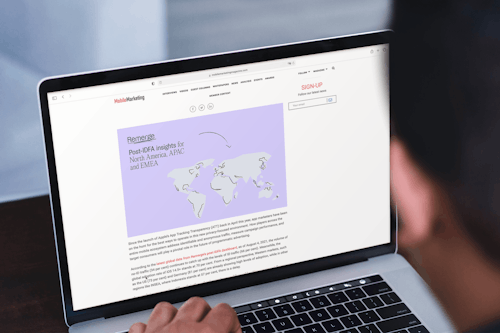App retargeting: What marketers can do in the privacy-first era
October 31, 2023

Why in-app retargeting went privacy-first
As consumers have become more conscious of how their data is being used online, technology providers have adapted their mobile products in a bid to better protect their user's privacy. Let’s take a look at the two biggest players right now:
iOS and the ATT framework
Apple made the first major privacy-centric move back in 2021 with their App Tracking Transparency (ATT) framework, which prompted iOS users to actively opt into or out of cross-app tracking anytime a user installed an app on their device.
A large portion of users naturally opted out of being tracked – and still do, which prevents their unique device ID from being shared with mobile advertisers. Without the identifier, advertisers can't collect or track a user's behavioral activity across the other apps they are using, which means that advertisers don't have the data they need to show highly-personalized retargeting ads to users who opted out of being tracked. Apple made these privacy changes without any advance notice, forcing mobile advertisers to rethink their strategies and relearn iOS retargeting from scratch.
You can follow the volume of available ID bid requests for iOS via our free, interactive dashboard.
Android and the Privacy Sandbox
Around the same time as the ATT framework dropped, Google embarked on a similar yet longer-term plan for Android devices, with the aim of protecting user privacy in a way that would be less disruptive to the mobile advertising industry. Google's Android Privacy Sandbox initiative, (which is still in development), consists of a series of tools for advertisers to run in-app retargeting campaigns without requiring them to access a user's behavioral data. Because the data never leaves the user's device, and the ad buying process takes place there too, user privacy is fully preserved.
Google has designed their Android Privacy Sandbox in close collaboration with key industry players, such as our team here at Remerge. We are working closely with Google, along with AppsFlyer, Adjust, Singular and supply partners like Verve Group, to test and shape the Android Privacy Sandbox.
Check out our Apptivate podcast episode with Google and Verve Group to learn more about how the Android Privacy Sandbox works.
Get mobile privacy news as it happens
We’ve built a knowledge hub to help mobile marketers navigate the latest privacy developments and find out how Remerge is collaborating with the tech giants to build and test solutions on both Android and iOS. Take a look and explore the newest privacy content, which includes how-to guides, blogs, videos and podcast episodes.
How privacy is impacting advertisers
When the shift towards privacy came about, the industry perception was that mobile retargeting and ad personalization would quickly die out. However, based on what we’ve seen from Apple's privacy updates and Google's plans for the Privacy Sandbox, the reality has not been as bleak. App marketers can still run high-performing retargeting campaigns for Android users, and for iOS users who have opted into cross-app tracking.
In 'The state of app retargeting' report we evaluate why retargeting remains a viable option when growing an app in the privacy-first era. The report includes some of our performance data and features insights from mobile marketing experts across multiple verticals, including gaming, food delivery, and e-commerce.
Let's take a look at some of the highlights.
Key takeaways from our report on 'the state of app retargeting'
1. Take advantage of available ID inventory to re-engage users
Although the volume of available ID-enabled traffic on iOS has dropped (90% before ATT and around 54% today), the portion of identifiable users is still large enough to run effective retargeting campaigns on iOS. As it stands, more than half of the inventory on iOS still has an IDFA - which is almost 40 billion bid requests per day. App marketers are taking advantage of this opportunity to maximize their user's lifetime value (LTV) and increase revenues by re-engaging high-value users.
Apple’s privacy changes do not apply to Android, which makes up approximately 75% of the app ecosystem and accounts daily for over 200 billion ID-enabled bid requests, (also know as 'opportunities to show an ad').
2. Continue running in-app retargeting campaigns on Android and iOS
At Remerge, we’ve enhanced our programmatic platform and hit all-time company highs for several performance metrics since the arrival of Apple's privacy framework. As a result, our company’s retargeting revenues grew month-over-month following the launch of ATT.
Despite the arrival of the ATT framework, we delivered more ad clicks and recorded a jump in re-engagements (unique app opens) for all of our retargeting campaigns combined.
Download the report to access a breakdown of our ad clicks and re-engagements for Android and iOS.
3. Prepare for the no-ID future
Now is the ideal time for app marketers to collect more data and insights about their users’ behavior and interests. This type of information will lay the foundations for optimizing app growth campaigns on no-ID traffic (i.e. SKAdNetwork and incrementality campaigns).
The sooner app marketers start running retargeting campaigns, the more data points they will acquire about their audiences, such as which other apps they have downloaded or at what time of the day they make purchases. This data allows algorithms (and people) to learn which publishers and campaign setups will yield the best performance results.
« In-app retargeting remains a key strategy in continuing to engage users who play our games »
Mandy Lin, User Acquisition Executive, Gumi
Rethink your mobile marketing strategies
Apple’s privacy changes may not have had the devastating impact many expected, but it has forced app marketers to revisit their mobile marketing strategies. We asked some of our clients why they are investing in retargeting after the launch of ATT and what advice they would give to those deciding whether to run these types of campaigns on Android and iOS.
Access the full analysis in The state of app retargeting, which includes the thoughts of mobile marketers at Gumi, Spoon Radio, Just Eat Takeaway.com, Woowa Brothers, Renta!, Joom, Blind Ferret, Tutoring, Headlight, and Etermax.
Mandy Lin, User Acquisition Executive, Gumi
“In-app retargeting remains a key strategy in continuing to engage users who play our games. Within the mobile gaming industry, increased competition has made it more difficult to retain users, and so in-app retargeting is very helpful in making sure we continue to engage our users beyond the point of install.”
Victor Hernandez, Senior Mobile Performance Manager, Lieferando
App retargeting is changing as there is now less ad personalization and less accuracy. But it’s still possible and you will miss out on a huge opportunity if you don’t engage with your existing customers.”
More insights on in-app retargeting
Access all of the insights on the state of app retargeting in our new report.





